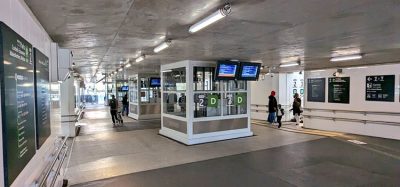The Alan Turing Institute’s new research programmes focus on smart cities
- Like
- Digg
- Del
- Tumblr
- VKontakte
- Buffer
- Love This
- Odnoklassniki
- Meneame
- Blogger
- Amazon
- Yahoo Mail
- Gmail
- AOL
- Newsvine
- HackerNews
- Evernote
- MySpace
- Mail.ru
- Viadeo
- Line
- Comments
- Yummly
- SMS
- Viber
- Telegram
- Subscribe
- Skype
- Facebook Messenger
- Kakao
- LiveJournal
- Yammer
- Edgar
- Fintel
- Mix
- Instapaper
- Copy Link
Posted: 29 November 2018 | Intelligent Transport | No comments yet
A new urban analytics programme will focus on using data and artificial tools to develop the concept of smart cities and the technologies involved.


The Alan Turing Institute has announced the launch of two new research programmes – one focused on urban analytics and the second on data science for science.
These will join the seven other programmes currently running in areas such as AI, government engineering and defence.
The Turing’s urban analytics programme will focus on the process, structure, interactions and evolution of agents, technology and infrastructure within and between cities across spatial and temporal scales.
The programme will support assessments, projections and interventions which determine the economic and social welfare of people, businesses, governments and third-sector agencies. In addition to government and public planning, the programme is relevant to organisations across sectors including retail, financial services, mobility, health, policing and utilities.
The urban analytics programme will be led by Professor Mark Birkin, Turing Fellow and Professor of Spatial Analysis and Policy in the School of Geography, University of Leeds. Birkin is also a Fellow of the Academy of Social Sciences and a Fellow of the Royal Geographical Society.
Professor Mark Birkin, Programme Director for Urban Analytics, said: “The Institute has announced its urban analytics programme at an opportune time. New data from ‘smart cities’ is providing transformative insights all over the world. Devices ranging from wearables to smart tickets will permit deeper understanding of behaviour and lifestyles, economic prosperity, mobility and health, with positive impacts for business, planners and policymakers as well as the scientific community. The Turing is ideally placed to exploit these opportunities through the advancement of methods ranging from visual simulation to artificial intelligence. I am looking forward to working with the Turing’s unique network of universities and external partners to create an ambitious programme of academic investigation with real-world impact.”
All the Institute research programmes are drawn from eight research challenges published earlier in 2018 which depict the areas in which data science and AI can have the biggest impact.
The data science for science programme aims to ensure that the research community can make effective use of state-of-the-art methods in artificial intelligence and data science. The programme will facilitate collaborative working with researchers from all disciplines across the Turing’s university partner network and with national research facilities.
Adrian Smith, Institute Director and Chief Executive, said: “Data science and artificial intelligence are wide-ranging sciences which are set to have a considerable impact on many different areas of research. This is clear through the rapid growth of the Institute within such a short time, as we expand to nine research programmes. In our urban analytics programme, data science and AI tools and expertise will be developed and deployed alongside spatial analysis, geostatistics and a wide variety of disciplinary perspectives.”
Related topics
Artificial Intelligence, Infrastructure & Urban Planning, Traffic Management
Related organisations
The Alan Turing Institute
Related people
Adrian Smith, Mark Birkin







